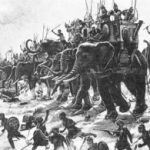Thomas Edward Black Jack Ketchum

Whether or not he aimed to be late, Thomas Edward “Black Jack” Ketchum missed the dinner bell by more than an hour on April 26, 1901. In fact, his original 9 a.m. Appointment on the gallows was delayed by more than four hours while authorities tried to ensure Ketchum’s execution was both humane and permanent.

Thomas Edward (Black Jack) and Samuel W. Ketchum were members of a gang of outlaws that terrorized Arizona, New Mexico, and West Texas in the 1890s. Sam was born on January 4, 1854, in Caldwell County, and Tom was born in San Saba County on October 31, 1863. They were the sons of Green Berry and Temperance Katherine (Wydic) Ketchum and grew up in San Saba, Texas. Their father had been coroner of Christian County, Illinois, before coming to Texas, where he may have been a doctor. His sons were ranch boys of little education. Sam married Louisa J. Greenlee in San Saba on February 4, 1874, according to family records; Tom never married. Tom left Texas about 1890, possibly because of a murder or a train robbery, and went to work for cow outfits in the Pecos Valley of New Mexico. By 1894 Sam had joined him, and the brothers began a career of crime, including killing a merchant near Carrizo, robbing post offices, and holding up stages, trains, and a railroad station. In 1897 they spent a good deal of time across the line in Mexico but stopped two trains in Arizona. On September 3, 1897, they held up the Colorado Southern passenger train near Folsom. In 1898 apparently there was some disagreement in the ranks, and Black Jack was not present when Sam and others again held up the Colorado Southern near Folsom on July 11, 1899. A posse caught up with them; Sam was wounded and captured and died two weeks later in the penitentiary at Santa Fe. Two peace officers and another of the robbers were killed in the battle. Not knowing of the outcome of Sam's last attempt, Black Jack determined to make one more raid and tried, singlehanded, to hold up the Colorado Southern, again near Folsom, on August 16, 1899. Wounded by the conductor, he was picked up beside the tracks next day. On October 5, 1900, he was sentenced to hang. The sentence was carried out at Clayton on April 26, 1901. The Ketchum gang was blamed for a good many crimes that they may not have committed. Apparently they had connections with a larger organization of outlaws. It is also possible that many of the crimes attributed to Black Jack Ketchum were committed by Will 'Black Jack' Christian and his brother, and that Tom Ketchum inherited the name and reputation after Christian was killed; however, the facts of Tom Ketchum's career indicate that his notoriety outdistanced that of Christian.


- Thomas Edward 'Black Jack' Ketchum’s death sentence Flickr/Jimmy Emerson, DVM Black Jack Ketchum was a cowboy who founded an outlaw group called the High-Five Gang.
- Black Jack Ketchum Thomas Edward Ketchum was born on October 31,1863 in San Saba County, Texas, son of Green Berry Sr.Ketchum and Temperance Katherine Wydick Ketchum. Thomas Edward Ketchum had four siblings two brothers and two sisters His father died when he was only five years old and his mother was blind several years before she died in 1873.
- Dark-complected and dark-haired Tom was called 'Black Jack' after another swarthy gang leader, Black Jack Christian (who was was killed in Arizona in 1897). The Ketchum Gang included Will Carver and Elzy Lay, outlaws who had ridden with Butch Cassidy's Wild Bunch. The gang robbed stores, post offices, stagecoaches, and trains.
- Thomas, Edward 'Black Jack' Ketchum was born on month day 1863, at birth place, Texas, to Green, Berry Ketchum and Temperance, Katherine Widick. Thomas had one brother: Samuel Ketchum. Thomas passed away on month day 1901, at age 37 at death place, New Mexico.
Thomas Edward Black Jack Ketchum Quotes
Texas cowhands-turned-outlaws Tom and Sam Ketchum, along with range pals like David Atkins and Will Carver, robbed trains and became notorious in the Southwest.
By Jeffrey Burton
At almost 1:15 on the afternoon of Friday, April 26, 1901, a one-armed man in a black suit hurried up the 13 steps of the gallows at Clayton, Union County, New Mexico Territory. Tom Ketchum, an attested but unconvicted killer and the most notorious outlaw in the Southwest, was soon to become the first person to suffer public judicial execution for merely attempting to rob a railroad train. A bad life was about to end for a bad reason. And the ending would be worse, for he would not die in the officially approved fashion-from breakage of the neck vertebrae-but from decapitation at the rope's end.
At 17 minutes past the hour, and at the second attempt, Sheriff Salome Garcia's hatchet sliced through the control rope, the trap was sprung, and in a moment or two Tom Ketchum had made history-twice. The clicking cameras mounted beside the stockade snapped again and the ghastly scene was captured for all time: There, held on its side by a doctor and a deputy sheriff, was the body of Thomas Ketchum, and there, in the bloodied black hood held in place by horse-blanket pins, was Ketchum's severed head.
'Nothing out of the ordinary happened,' Sheriff Garcia declared. 'No bungling whatever. Everything worked nicely and in perfect order.' Like many of the others present, the sheriff probably was not lastingly discomforted by the horrifying spectacle of butchery that had been enacted before his eyes. It was a bad and hard way to die, but Ketchum, manifestly, had been a bad and hard man.



